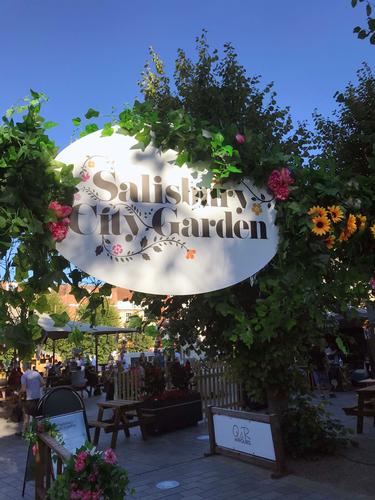FOR most of the year the Market Square in Salisbury, Wiltshire’s main tourist destination apart from Stonehenge, is a vast empty space, a huge expanse of nicely done paving that is home to a twice-weekly market.
It’s a difficult space to fill and in the evenings it is home to bored youths on skateboards and bikes intimidating anyone who ventures across.
The legions of foreign tourists, whose home cities have beautiful squares adorned with fountains, statues and busy eateries, must wander through Salisbury’s winding streets and then stumble blinking into the barren square, no doubt wondering what atrocity must have taken place there to have rendered it so devoid of life.
But not this summer. Any time after 4pm the square has been teeming with life, the air is filled with music and lively tables spill out from the pubs and restaurants lining the perimeter. In one corner the Salisbury City Garden, a pop-up bar is filled to the brim.
It has been so vibrant and welcoming, you could almost be in Nice, Barcelona or Madrid, and all it needed to inspire this was a global pandemic and the worst recession since the Vikings invaded.
Why no one has ever thought of using the county’s largest and potentially most impressive focal point in this way before is a mystery.
But now the city, however much forced into it in the face of a crisis, has discovered a new USP, which is one huge silver lining from this awful time.
A survey by Salesforce into how business is coping with the changing needs of customers during the pandemic identified the three main traits essential for survival (and for many it is just that) – flexibility, preparedness and empathy.
Salisbury, like many other towns across the county, has businesses, particularly those in hospitality, who have shown all three. They are being flexible by expanding their outside offering with extra tables (aided by councils relaxing draconian limitations) and in the case of the pop-up bar, creating a whole new business.
They are showing empathy with what customers need to feel comfortable – plenty of space – and preparedness by having efficient systems to take orders at the table or via an app and having the staffing to make it work. On top of all that it is being done with a smile.
Businesses, especially those who in retail and hospitality, will be finding that they need to work harder to keep customers coming back and the only way to do that is by improving the way they make them feel.
Hospitality businesses have taken this too lightly in the past. They spend tens of thousands of pounds and hours of deliberation on décor and branding, agonise over menu fonts and to create the perfect ambiance for their clientele. But then they’ll entrust the handling of that whole experience to a barely-trained student on minimum wage with all the social graces of a shipwrecked hermit who is more concerned with snapchatting their friends than actually listening to the customer.
In the Salesforce survey 70 per cent of the 3,500 businesses polled said that showing some empathy had resulted in customer loyalty and if not an increase in business, at least a maintained level. Its conclusion is that only by understanding your customer’s needs, by listening to them and putting ourselves in their shoes, can we give them the service that wins their loyalty.
Those three traits identified by the survey are just as relevant to any sector and it will surely only be those enterprises who embrace them who will navigate a safe passage through the shark-infested waters that lie ahead.

